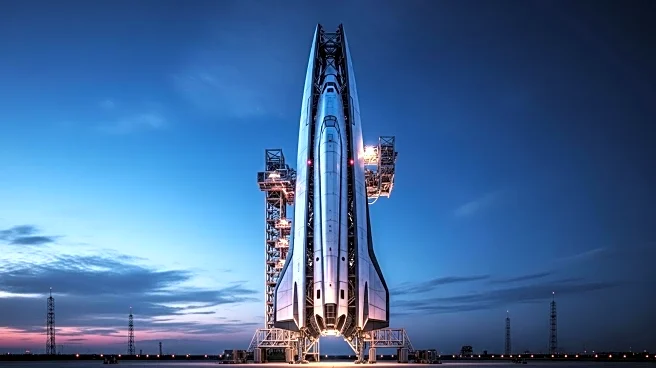What's Happening?
SpaceX is set to launch the eleventh test flight of its Starship megarocket from Boca Chica, Texas. This flight marks the final test of Starship Version 2, with the launch window opening at 7:15 p.m. Eastern on October 13. The test aims to stress-test the rocket's heat shield and demonstrate maneuvers for future reusability. The Super Heavy Booster will splash down in the Gulf of Mexico, while the upper stage will land in the Indian Ocean. SpaceX plans to deploy dummy Starlink satellites and perform engine relights during the flight. The company is under pressure to achieve critical milestones before introducing Version 3, which is expected to launch in early 2026.
Why It's Important?
The successful completion of this test flight is crucial for SpaceX as it transitions to the next iteration of Starship, Version 3. The ability to demonstrate rapid reusability and advanced maneuvers is vital for the company's long-term goals, including deep space missions and commercial satellite deployments. Achieving these milestones could solidify SpaceX's position as a leader in aerospace innovation, impacting the U.S. space industry and potentially influencing public policy on space exploration. The test also serves as a critical step in proving the viability of reusable rockets, which could reduce costs and increase accessibility to space.
What's Next?
Following the test flight, SpaceX will analyze the data to ensure the rocket's systems performed as expected. If successful, the company will proceed with the development of Starship Version 3, which promises greater payload capacity and enhanced capabilities. The aerospace community and investors will closely monitor the outcomes, as they could affect SpaceX's future contracts and partnerships. The next steps will involve refining the design and preparing for the first launch of Version 3, anticipated in early 2026.
Beyond the Headlines
The test flight highlights the growing importance of reusable rocket technology in reducing space exploration costs. It also underscores the competitive nature of the aerospace industry, where innovation and rapid development are key to maintaining leadership. The ethical implications of space exploration, including environmental impacts and international cooperation, may become more prominent as SpaceX advances its technology.










